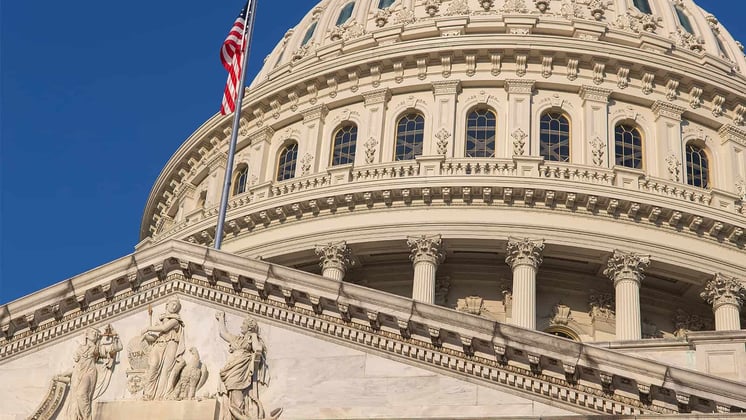
How the One Big Beautiful Bill Will Impact Your Clients: What Agents and Advisors Need to Know

The One Big Beautiful Bill Act of 2025 (OBBBA 2025) was signed into law by President Trump on July 4, 2025, and will have far-reaching impacts on millions of Americans.
This comprehensive bill presents both new opportunities and challenges for insurance agents and financial advisors who work with seniors and small business clients.
While the breadth of the legislation is extraordinary, Senior Market Sales® (SMS) breaks down some of the key changes that insurance agents and financial advisors should know in order to guide clients in the coming days, months and years.
Your Key Takeaways:
- The OBBBA will impact some seniors’ income through extended tax cuts, increased standard deductions and a new senior bonus deduction of $6,000 for some Americans age 65 and older.
- The permanent extension of the 2017 tax rates and brackets provides numerous planning opportunities, including more time and a longer runway to do Roth conversions at historically favorable tax rates.
- Expect to see significant disruption in the Affordable Care Act marketplace for under-65 individual health plans, including increasing premiums.
- The OBBBA includes provisions impacting Medicare Savings Programs (MSPs) and Medicaid, primarily through changes to eligibility and enrollment processes.
- The Congressional Budget Office estimates that 1.3 million seniors will lose their dual eligible status, meaning they will lose their Medicaid coverage.
Tax Cuts and Other Tax Changes
The OBBBA extends several major provisions of the Tax Cuts and Jobs Act of 2017 (TCJA), many of which were set to expire at the end of 2025. If the TCJA’s provisions had expired all at once, 62% of filers would have faced a tax increase relative to current policy in 2026, according to the Tax Foundation.
In addition to the permanence of the 2017 tax cuts, some of OBBBA’s key provisions impacting seniors include:
- A permanent increase in the standard deduction
- A new senior bonus deduction to help offset Social Security taxes, available for tax years 2025 through 2028
- An above-the-line deduction for cash gifts to charities beginning in 2026 for non-itemizers
- A temporary increase on the cap for itemized deductions for state and local taxes (SALT)
- A permanent increase in the federal estate and gift tax exemption amount
- A permanent extension of the 20% deduction for pass-through businesses
Many middle-income seniors may see an increase in their spendable income due to the increased standard deduction amount, the new charitable deduction for non-itemizers and the new senior bonus deduction.
Above those thresholds, the deduction phases out.
“Imagine the tax savings you could find for some of your clients who could stack the senior bonus with the standard deduction and other tax strategies. But because the senior deduction is only temporary, agents and advisors need to review clients’ retirement plans with some urgency to see if there’s an opportunity to maximize certain clients’ tax savings in this four-year planning window. When you uncover tax savings, you free up money for their other goals.”
— Chris McDonald, Vice President and Director of Sales for Annuities at SMS
To be sure, not everyone will be able to take advantage of all the provisions. And the senior bonus deduction may have hidden pitfalls that tax experts are still assessing. The Urban-Brookings Tax Policy Center, which produces independent analysis of tax and fiscal policy, estimates that fewer than half of older adults will benefit from the senior deduction.
But the opportunity to help those who may benefit does exist, and many seniors may turn to you for clarity. Specifically, they may ask why they’re still being taxed on Social Security at all, following confusion ignited by a Social Security Administration (SSA) press release issued just hours after the Congress passed the bill.
Interested in Learning More From a Marketing Consultant?
Does the One Big Beautiful Bill Eliminate Taxes on Social Security?
The OBBBA does not end the federal taxation of Social Security.
The Tax Policy Center, which is generally regarded as nonpartisan, issued a statement “correcting” the SSA press release and SSA email to tens of millions of Americans. The SSA claimed that the megabill “eliminates taxes” on Social Security benefits for 90% of recipients.
The Tax Policy Center’s statement and multiple reports by the media and other organizations like the Bipartisan Policy Center have tried to clear up the confusion by explaining that the law does not include a direct tax cut on Social Security. Social Security benefits are taxed like other income, and the new law does not change that.
Rather, the law’s new senior deduction can indirectly impact how much Social Security income is subject to tax, by reducing taxable income enough that some seniors will not owe federal taxes on their Social Security benefits.
Who Benefits the Most From the Senior Bonus Deduction?
So who will benefit?
The seniors who may benefit the most from it are those making between about $80,000 and $130,000, according to the Tax Policy Center. Most would see their income taxes on Social Security benefits reduced, not eliminated.
“There’s a big opportunity here to help middle-income seniors, whether through tax-loss harvesting or Roth conversions, or any number of tax strategies,” McDonald said.
Using Roth Conversions to Lower Taxable Income
There may be hidden pitfalls with the new senior-age deduction, but the permanent extension of the 2017 tax rates and brackets provides taxpayers more time and a longer runway to do Roth conversions at historically favorable tax rates and fill their tax-free asset bucket. For this reason, Roth conversions will continue to be a popular strategy for tax diversification.
 Not Doing Roth Conversions?
Not Doing Roth Conversions?
Seize the planning opportunity following the One Big Beautiful Bill Act.
Federal Estate and Gift Tax Exemption
For agents and advisors working with affluent clients, the looming expiration of the federal estate and gift tax exemption has led to some anxious moments in the past few years.
The OBBBA establishes a permanent, inflation-adjusted lifetime estate and gift tax exemption of $15 million per person ($30 million if married) beginning in 2026.
Without this change, the exemption amount would have expired at the end of 2025 and reverted to $7.2 million on Jan. 1, 2026. This update will provide greater stability to the estate planning market, and the larger exemption amount will allow families to transfer more of their wealth to future generations.
Helping Small Businesses
Life insurance is a vital, yet often overlooked part of small business planning. Neglecting to incorporate life insurance into a small business’ comprehensive business plan can leave the company vulnerable to financial setbacks and disruptions. It also could mean the business misses out on benefits such as the tax-deferral features of permanent life insurance.
The OBBBA presents an opportunity for agents and advisors to help small business owners.
What Is the Section 199A Deduction?
Many owners of sole proprietorships, partnerships, S corporations and some trusts and estates may be eligible for a qualified business income (QBI) deduction — also called the Section 199A deduction — for tax years beginning after Dec. 31, 2017. The deduction allows eligible taxpayers to deduct up to 20% of their QBI, plus 20% of qualified real estate investment trust (REIT) dividends and qualified publicly traded partnership (PTP) income.
The OBBBA retains the existing Section 199A qualified business deduction (QBI) and makes the 20% deduction for business owners and self-employed individuals permanent. This is a big benefit for those small business owners who use cash flow from their business to fund life insurance and long-term care (LTC) premiums.
Changes to Medicaid and the Affordable Care Act
One of the most consequential impacts of the legislation involves health insurance for people under the age of 65 — namely, those relying on Medicaid, the joint federal and state program that provides health coverage to millions of low-income Americans, and those receiving subsidies to buy plans through the Affordable Care Act’s state and federal health marketplaces.
The Congressional Budget Office (CBO), the nonpartisan federal agency tasked with helping Congress make effective budget and economic policy, has estimated that that 11.8 million people would become uninsured due to Medicaid and ACA marketplace cuts by 2034.
The OBBBA:
- requires “able-bodied” Medicaid recipients to work, volunteer, attend school or participate in job training at least 80 hours a month, or qualify for an exemption such as being a caregiver or having a disability
- repeals the Biden Administration’s rule that simplified Medicaid eligibility
- increases the frequency of Medicaid eligibility redeterminations
- requires ACA policyholders to update their information annually instead of being automatically re-enrolled
- shortens the ACA’s open enrollment period by one month
The OBBBA’s Impact on Dual Eligibles
While the OBBBA will primarily impact those under 65, the CBO estimates that 1.3 million seniors will lose their dual eligible status, meaning they will lose their Medicaid coverage.
Disruption in the Under-65 ACA Market
Your clients with ACA coverage also may see increasing premiums, as the number of uninsured rises and especially if the subsidies are not extended.
“Expect to see disruption in the ACA marketplace,” said Dwane McFerrin, Senior Vice President, Med Solutions at Senior Market Sales. “Agents with ACA clients will be spending more time servicing them to ensure they remain covered, so they’ll need to lean on technology to work more efficiently and potentially diversify their product offerings to make up for lost business.”
What’s the OBBBA Impact on Medicare?
While Medicare was frequently mentioned in the political discourse over the bill, Medicare-related provisions were minimal compared to the ACA, McFerrin said, or their impact is still being assessed or expected to be a non-issue.
To the latter point, McFerrin expects Congress to intervene before OBBBA triggers $490 billion in cuts to Medicare from 2027 to 2034. The Statutory Pay-As-You-Go Act (PAYGO) of 2010 is a law that essentially requires Congress to ensure that any legislation that increases mandatory spending or decreases revenues does not increase the federal budget deficit. (The CBO estimates the bill would add $3.4 trillion to federal deficits over the next 10 years.)
McFerrin said SMS is reviewing the OBBBA’s new limits on low-income Medicare enrollees to access Medicare Savings Programs that help cover premiums and cost-sharing.
Other OBBBA changes impacting seniors’ Medicare and long-term care include:
- A 2.5% increase in the Medicare Physician Fee Schedule for calendar year 2026
- Elimination of Medicare eligibility for some people with lawful immigration status who have already paid into the program — a change from longstanding policy, which recognizes eligibility for everyone who has paid sufficient Social Security and Medicare taxes
- A 10-year moratorium (through fiscal year 2034) on implementation, administration, or enforcement of the minimum long-term care facility staffing levels required by the May 10, 2024, CMS final rule
- A $50 billion rural hospital stabilization fund
 While Medicare dodged major changes with the OBBBA, the upcoming 2026 Annual Election Period (AEP) is full of disruption like the previous year. From rate increases to more Part D plans dropping commissions, agents will face another challenging AEP season. Find out how SMS’ proprietary technology helps agents run plan reviews and recommend changes to their clients efficiently during AEP.
While Medicare dodged major changes with the OBBBA, the upcoming 2026 Annual Election Period (AEP) is full of disruption like the previous year. From rate increases to more Part D plans dropping commissions, agents will face another challenging AEP season. Find out how SMS’ proprietary technology helps agents run plan reviews and recommend changes to their clients efficiently during AEP.
The Best Support to Help You and Your Clients Navigate Legislative Changes
SMS is continuously monitoring the impact of the OBBBA and other legislation that affects your business and your clients. To learn more about the free support available through SMS, reach out here or call to speak with an SMS Med Solutions marketing consultant at 1.877.888.9996 or a Financial Solutions marketing consultant at 1.877.645.4939.


Dwane McFerrin Receives Underwriter of the...
The Omaha Association of Health Underwriters (OAHU) has selected Dwane McFerrin, Senior Vice President, Med Solutions at Senior Market Sales® (SMS),...

How Insurance Agents Can Help Millions...
The end of Medicaid continuous enrollment March 31, 2023, means an estimated 15 million Americans could lose Medicaid and need health insurance — and...